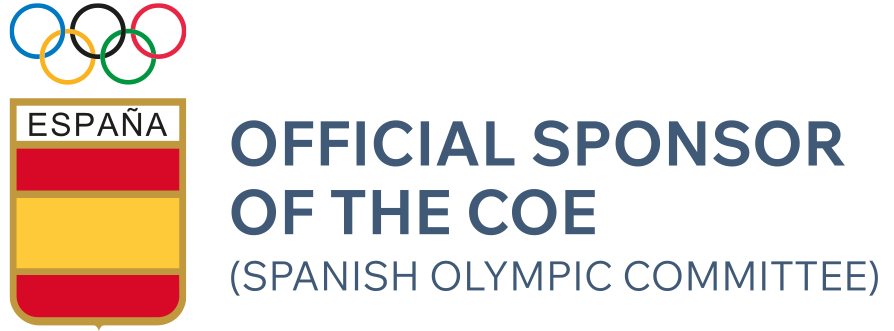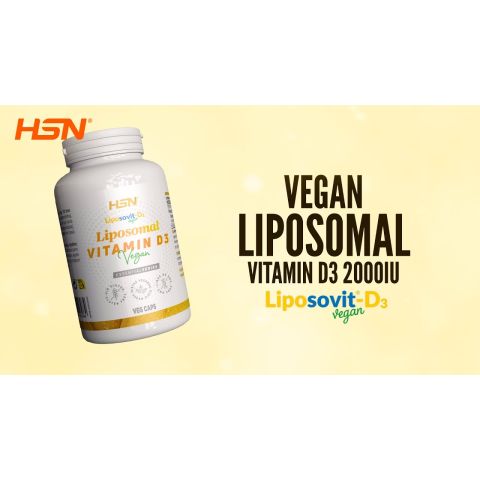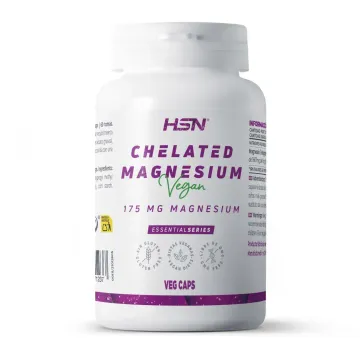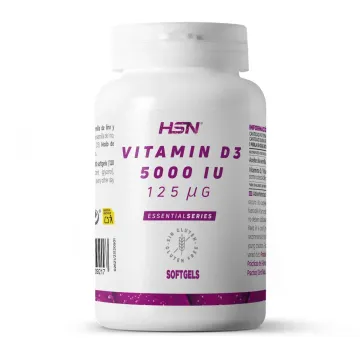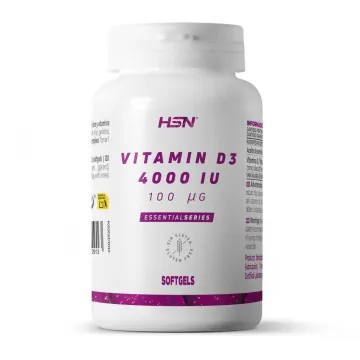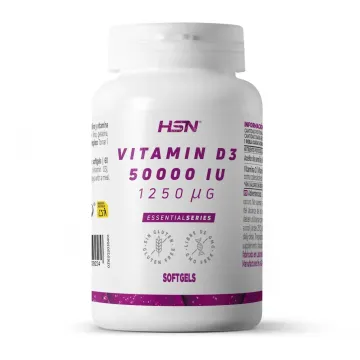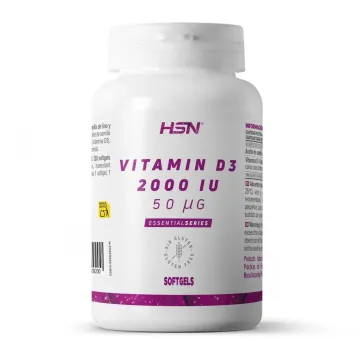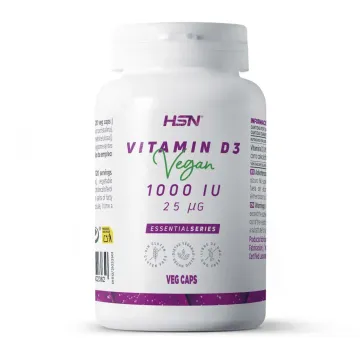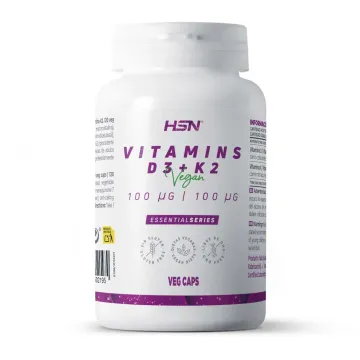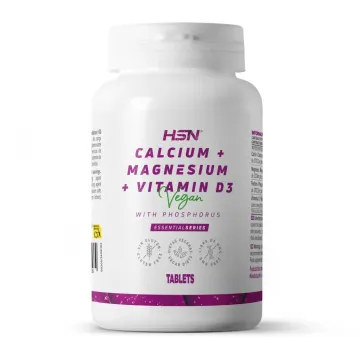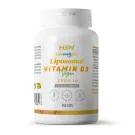- Pure liposomal Vitamin D3 of certified vegan origin from lichen.
- Liposovit® Raw Material - European manufacture under the highest quality and safety standards.
- Liposomal structure - Improved absorption and stability - Optimal bioavailability.
- Cholecalciferol form. Pure vitamin D3 without mixed ergocalciferols (0% D2).
- Better digestive tolerance thanks to its liposome structure. Suitable for consumption without food.
- Obtained by drying processes that are not aggressive towards the vitamin. It does not require a cold chain for preservation.
- Suitable for vegetarian and vegan diets. Free of Genetically Modified Organisms.
Vegan Liposomal Vitamin D3 - More absorption for more effectiveness
Vegan Liposomal Vitamin D3 (Liposovit®) 2000IU by EssentialSeries is an HSN vitamin supplement made from pure cholecalciferol, which is vitamin D3, obtained from natural vegan sources (lichen), free of genetically modified organisms and without the use of synthetic compounds, in liposomal form.
Liposomation is a process of elaboration of fatty bodies 'liposomes' which allow vitamins, either water-soluble or fat-soluble, to be 'protected' within their phospholipid structure. This is done to improve their environmental stability during storage, to improve the stability of the vitamin in the digestive environment, and to optimise their intestinal absorption to achieve the best vitamin activity.
Thanks to its natural lichen extraction process, and HSN's animal additive-free formulation in vegetable capsules, this vitamin D is suitable for vegetarian and vegan diets.
HSN offers you the best vitamin D3 on the market. Find out more!
The best possible raw material: Liposovit® - Manufacturing warranties
Liposovit® is a registered trademark of the Polish manufacturer Bart, which has developed a method of vitamin liposomation that is unrivalled on the market.

Liposovit® vitamins such as Liposovit-D3 Vegan® are vitamins that have been treated by patented liposomation processs that allow:
- Their environmental stability to be guaranteed, increasing it significantly compared to liposomal suspensions as they are commonly found.
- It does not require refrigeration or the maintenance of the cold chain during transport and storage.
- Its drying process ensures that the quality and size of the liposomes are not affected.
- No genetically modified organisms, preservatives, or allergens are used in the production process.
Liposome structure certified as native without disintegration
Thanks to all the quality guarantees certified by Bart, and our guaranteed care of the manufacturing process, the microscopic structure analyses of the vitamin D liposomes have been excellent.
Its structure is native, as it has not been degraded at any level.
This is important, as many manufacturers buy and market raw materials that do not have the necessary certifications to ensure that the phospholipid bonds that close the 'some' of the liposome are held together.
That is, if the phospholipids separate because their hydrophobic tail bonds break apart during the drying process, even if the origin was a liposomal vitamin, it is no longer a liposome, as the liposome is 'broken'.
The liposomes of our vitamin D are intact as they have been optimally preserved and their structure can be stored at the customer's home, with full guarantees, without the need for refrigeration.
It does not require cold maintenance, unlike many alternatives, although they do not indicate it.
The cold chain is a procedure that allows for the proper preservation of many foods and food supplements, a clear example being meat, which must be kept under refrigerated conditions from the first moment until it is consumed.
This cold chain in food is more common, but in food supplements, it is a great logistical difficulty, and what many supplement companies do is ignore the conservation conditions of their ingredients, without informing their customers.
This is not only unethical, it is outright fraud because a liposomal vitamin that requires refrigeration, as most of them do, but is not respected, loses its nutritional properties.
At HSN we do not work with refrigerated products, maintaining a cold chain following the necessary quality standards that the supplementation industry does not follow is difficult and impractical.
That is why we work with developers of unique raw materials that are stored at room temperature, a clear example being our probiotics, which do not need to be refrigerated when many others do.
Our liposomal vitamin D does not need to be stored in the fridge as its environmental stability is validated, which is a great advantage for our customers.
High concentration - 2000 IU of maximum biological effectiveness per vegetable capsule
Vitamin D is dosed in varying amounts between 1000 International Units (IU) and 4000 IU frequently.
At HSN you will find products with the entire spectrum of the usual dosing range: From 1000 units up to 50,000 units.
For the development of our first liposomal vitamin D3, we have chosen a high dose of vitamin D that can be easily adapted to the customer's needs. This is because two capsules are 4000IU and one capsule every two days is equivalent to 1000IU. Although our recommendation is to maintain the consumption of one vegetable capsule a day to provide these 2000 IU.
Suitable for vegetarian and vegan diets. Natural lichen origin / Non-synthetic / No lanolin
The cholecalciferol vitamin D3 in our liposomal vitamin D3 is extracted from lichen, an organism suitable for vegan consumption.
Unlike other options on the market that are sourced from lanolin, a fat from sheep's wool. This is an acceptable and generally good option but is not suitable for vegans.
Our vitamin is natural and vegan, obtained from vegetable lichen.
Free of Genetically Modified Organisms. Natural sourcing process for your nutrition
No genetically modified organisms are used in the cultivation, harvesting, and processing of the lichen.
The entire manufacturing process of liposomal vitamin D3, from the beginning, until it reaches your home, is traceable and certified as 100% GMO-free.
Vitamin D, known as the 'sunshine vitamin', is packed with properties
Vitamin D is essential for human nutrition, which is why so many ways of supplying it have been developed. The more we can improve the bioavailability of this vitamin, the better we can optimise human nutrition.
Vitamin D3 is particularly well known for its widespread deficiency, but also because dietary supplementation with vitamin D3 helps to improve the normal absorption and utilisation of calcium and phosphorus. This contributes to the maintenance of normal bones and teeth.
It also has positive properties for the immune system and muscles.
Should you take it? Should I choose liposomal or normal?
Vitamin D3 should be used as a dietary supplement by all adults in the West. Unless you live in the Caribbean all year round, you are likely to suffer from some kind of vitamin D-related nutritional insufficiency, as the amount of sunshine we are exposed to, even in countries with relatively enough sunshine, such as Spain, is insufficient.
Between the choice of liposomal and regular vitamin D; liposomal is your best option, as it is superior in absorption and bioavailability. However, both options are actually excellent, so we recommend you try both and go for the one that will give you the best results.
A simple and general recommendation is:
- If you use vitamin D all year round without a break, use normal vitamin D, not liposomal vitamin D.
- If you use vitamin D for a few months, such as during the autumn and winter seasons, but do not use it during the spring and summer, use liposomal vitamin D.
What's my dose? HSN experts' recommendation
We recommend the following guidelines:
In case of vitamin D3 insufficiency, we recommend the 5000IU product; and if there is a nutritional deficiency, 50000IU is the most concentrated presentation available.
Bibliographical references
- Gopi, S., & Balakrishnan, P. (2021). Evaluation and clinical comparison studies on liposomal and non-liposomal ascorbic acid (vitamin C) and their enhanced bioavailability. Journal of Liposome Research, 31(4), 356–364.
- Tripkovic, L., Lambert, H., Hart, K., Smith, C. P., Bucca, G., Penson, S., … Lanham-New, S. (2012). Comparison of vitamin D2and vitamin D3 supplementation in raising serum 25-hydroxyvitamin D status: A systematic review and meta-analysis. American Journal of Clinical Nutrition, 95(6), 1357–1364.
- Davis, J. L., Paris, H. L., Beals, J. W., Binns, S. E., Giordano, G. R., Scalzo, R. L., … Bell, C. (2016). Liposomal-encapsulated ascorbic acid: Influence on vitamin C bioavailability and capacity to protect against ischemia-reperfusion injury. Nutrition and Metabolic Insights, 9, 25–30.
- Nair, R., & Maseeh, A. (2012). Vitamin D: The sunshine vitamin. Journal of Pharmacology and Pharmacotherapeutics, 3(2), 118–126.
- González-Molero, I., Morcillo, S., Valdés, S., Pérez-Valero, V., Botas, P., Delgado, E., … Soriguer, F. (2011). Vitamin D deficiency in Spain: A population-based cohort study. European Journal of Clinical Nutrition, 65(3), 321–328.
 Before
Before After
After During
During Morning
Morning Afternoon
Afternoon Night
Night


